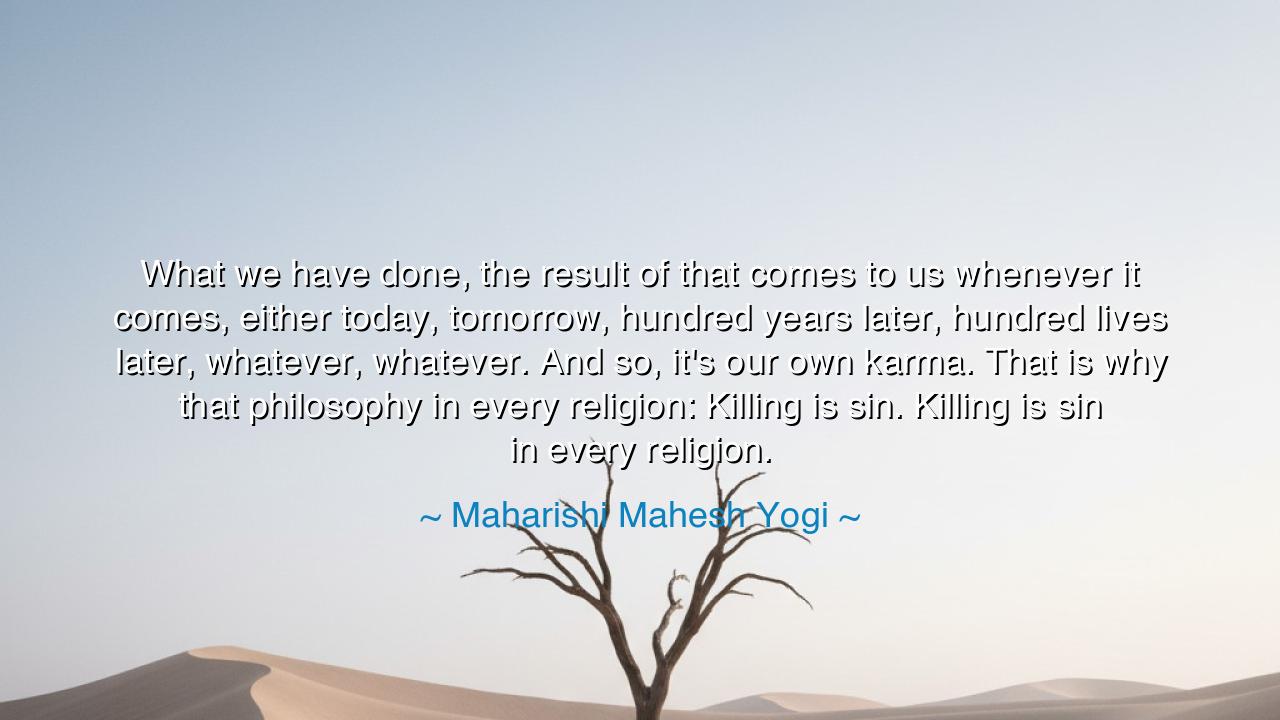
What we have done, the result of that comes to us whenever it
What we have done, the result of that comes to us whenever it comes, either today, tomorrow, hundred years later, hundred lives later, whatever, whatever. And so, it's our own karma. That is why that philosophy in every religion: Killing is sin. Killing is sin in every religion.






"What we have done, the result of that comes to us whenever it comes, either today, tomorrow, hundred years later, hundred lives later, whatever, whatever. And so, it's our own karma. That is why that philosophy in every religion: Killing is sin. Killing is sin in every religion." These words by Maharishi Mahesh Yogi tap into the eternal truth of karma—the universal law of cause and effect that binds every action to its consequences. The Yogi speaks of the profound interconnectedness of all actions and consequences, reminding us that the ripple of our deeds stretches far beyond the moment they are carried out. It is a law that transcends not only time but also space, extending across generations and lifetimes. Just as the wind carries a scent across vast distances, our actions leave an enduring mark, reverberating in the world long after the deed is done.
The idea of karma, central to many ancient traditions, especially in the Hindu, Buddhist, and Jain philosophies, teaches us that every action, no matter how small, ripples outward and shapes the world around us. Karma is not simply about rewards and punishments; it is the understanding that our deeds are interconnected with the universe, that what we sow, we will eventually reap—sometimes immediately, sometimes far into the future. This is why Maharishi Mahesh Yogi speaks of actions—like killing—as having universal consequences. The sin of killing is not confined to one moment or one life, but extends throughout time and affects both the individual and the society.
Consider the teachings of the Buddha, who, like Maharishi Mahesh Yogi, emphasized the importance of right action in achieving a state of peace and enlightenment. The Buddha’s Noble Eightfold Path calls for right action, which includes the avoidance of harm to others, particularly through actions such as killing. Buddhism teaches that all beings are interconnected, and to harm one is to harm all. The act of killing, therefore, creates negative karma that not only impacts the victim but also disrupts the spiritual journey of the one who commits the act. Maharishi Mahesh Yogi’s reminder that killing is a sin in all religions aligns with the Buddha's teaching that compassion, rather than violence, is the path to peace.
In ancient Greece, the philosopher Socrates spoke of virtue and wisdom as the highest pursuits for the soul. He believed that actions driven by ignorance or passion, such as violence or harm toward others, were destructive to the soul. Socrates' trial and death exemplify his belief that, even in the face of unjust persecution, one must not resort to violence. His life and death show that, even in the most challenging circumstances, it is the quality of action and the moral integrity of the individual that shapes their karma. The lesson of Socrates, much like the Maharishi Mahesh Yogi’s insight, is that each action we take, whether for good or ill, is a step in our spiritual journey, and we must be mindful of the consequences it brings.
In more recent history, we see the destructive power of violence and anger in the lives of leaders who resort to harmful actions. Consider the impact of Adolf Hitler during World War II. His actions, driven by hatred and a desire for dominance, led to the death of millions and left an indelible mark on history. The karma of his deeds is felt to this day, not only in the physical scars of the world but in the collective consciousness of humanity. His actions did not only affect him or his victims—they altered the course of history, leaving a legacy of pain that ripples through generations. The karma of such deeds, as the Maharishi says, can span lifetimes.
Yet, the great lesson of karma is not one of fatalism, but of empowerment. It teaches us that we have the power to create positive outcomes by choosing right action. Every moment is an opportunity to act in ways that contribute to the greater good, to heal rather than harm, and to sow compassion instead of violence. Maharishi Mahesh Yogi’s words remind us that each decision we make contributes to the web of life, and it is within our power to choose actions that will bring about positive and life-affirming results.
The lesson from the Maharishi’s quote is one of responsibility and awareness. By recognizing that our actions create a chain of events that will affect not just our present lives, but possibly many others in the future, we can live with greater mindfulness and integrity. Karma is not just a law of retribution but a powerful tool for spiritual growth. The more conscious we are of the impact of our choices, the more we can align our actions with compassion, wisdom, and peace.
In practical terms, this means taking responsibility for our actions and choosing to live in a way that promotes the well-being of all. It means choosing peace over violence, love over hate, and understanding over judgment. It also means acting with kindness, patience, and humility, understanding that our actions today will shape the world of tomorrow. By living with awareness of our karma, we can ensure that our legacy is one of goodness and positive transformation, both for ourselves and for the generations to come.






AAdministratorAdministrator
Welcome, honored guests. Please leave a comment, we will respond soon